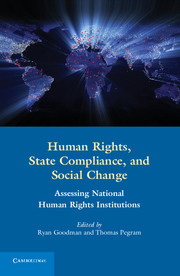Book contents
12 - Tainted Origins and Uncertain Outcomes
Evaluating NHRIs
from PART IV - Final Reflections
Published online by Cambridge University Press: 05 June 2012
Summary
Interviewer: What is the most frequent dilemma encountered in the establishment of a National Institution?
Brian Burdekin: The tendency of governments to establish the National Institution, but then to appoint inappropriate people to lead it and give it inadequate resources to fulfill its mandate.
Introduction
More than a decade has passed since the great proliferation of national human rights institutions (NHRIs) began in the early 1990s and they are now firmly implanted in the normative and institutional firmament. But despite a tendency to celebrate this phenomenon, the evidence suggests reasons for circumspection. Even the best reputed NHRIs perform inconsistently; political and economic contingencies drive major fluctuations. While many NHRIs have gained deserved fame for bold positions at critical times, these “heroic” moments are often followed by depressing, “postheroic” periods when the NHRI bends more supinely to government interests.
It is not surprising that a relatively new institutional phenomenon that has spread so quickly around the world would be buffeted by competing forces, some pushing for real domestic human rights reform, others simply to profit from promotional opportunities.
- Type
- Chapter
- Information
- Human Rights, State Compliance, and Social ChangeAssessing National Human Rights Institutions, pp. 297 - 323Publisher: Cambridge University PressPrint publication year: 2011
References
- 2
- Cited by



